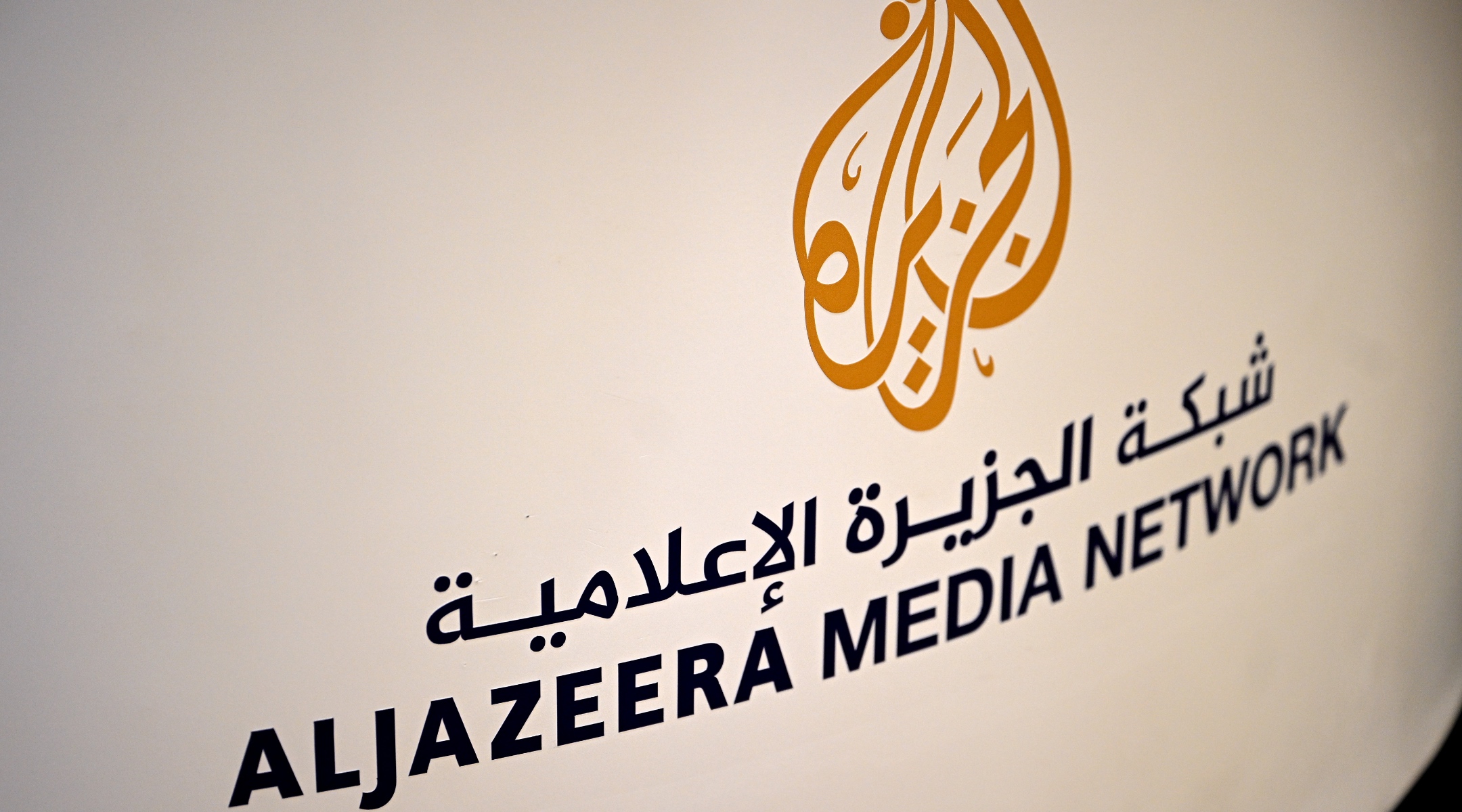What is behind Israel’s shutdown of Al Jazeera?
Israel says the Qatari-owned station’s lopsided coverage of the war endangers soldiers, but allies describe the closing of Its offices in Israel as an assault on press freedoms

A general view of the Al Jazeera logo during day two of Web Summit Qatar 2024 at the Doha Exhibition and Convention Center, Feb. 28, 2024. in Doha, Qatar. (Ramsey Cardy/Sportsfile for Web Summit Qatar via Getty Images)
WASHINGTON (JTA) — This week, Israel shut down Al Jazeera in the country and in the West Bank, sending law enforcement into the local offices of the Qatari-owned news giant to confiscate equipment.
What it didn’t do was keep Israelis from watching the outlet, which remains the most popular media channel in the Arab world.
“I’m watching Al Jazeera on my computer,” Zvi Barel, an analyst who writes on Israeli-Palestinian affairs for Haaretz, said in an interview on Tuesday, two days after the purported shutdown.
Israel’s decision to shutter the station, the most far-reaching step the country has taken against a major foreign outlet, has spurred criticism from allies, including the Biden administration, and an outcry from Israeli and foreign journalists in Israel who say it is an assault on freedom of the press that bears the hallmarks of an authoritarian government. Israeli officials are defending it as a necessary curb on an agent of a hostile state.
But Middle East analysts say the reason for the closure has more to do with Israel’s international relations than with threats inside Israel. They say closing the channel’s offices, something other countries in the Middle East have also done, may be a way to settle scores with Qatar. Or it may be an act of information warfare as Israel faces mounting protests across the globe.
“Israel is the country that perceives that it’s losing dreadfully in the media space conflict, which is the information warfare surrounding the Gaza War, and the perceptual conflict,” said Hussein Ibish, a Washington-based senior scholar at the Arab Gulf States Institute who has been critical of Israel’s war effort.
Al Jazeera is a rich target, he said, because its coverage of the Gaza Strip is the most comprehensive and reaches every corner of the Arab world. “It is by far the most professional and organized and well financed, reporting operation in Gaza,” he said.
What the closure means for the network’s searing coverage of Israel’s war with Hamas in Gaza is not so clear. Al Jazeera’s coverage of the war, the spur for the shutdown, continues unabated. Shutting the offices deprives the network of access to Israel — and of Israeli comment on the war, which Al Jazeera routinely solicits — but its operations in the Gaza Strip remain unaffected.
Messages appeared on Israeli satellite providers saying the channel was no longer available. “In accordance with the government decision, the Al Jazeera station’s broadcasts have been stopped in Israel,” Yes, one of the providers, told its viewers. But its streaming websites in multiple languages remained active online.
The law that enabled Al Jazeera’s closure was introduced by Zvi Sukkot, a far-right lawmaker, and passed by the full Knesset, Israel’s parliament, earlier this year. To the law’s supporters, Al Jazeera is less a foreign media channel than the agent of a hostile state that houses Hamas’ leadership, and whose lopsided coverage of the war endangers soldiers. Israel’s cabinet approved the closure unanimously.
“Al Jazeera correspondents have harmed the security of Israel and incited against IDF soldiers,” Prime Minister Benjamin Netanyahu said in a statement. “The time has come to eject Hamas’s mouthpiece from our country.”
Netanyahu’s deputies are celebrating the decision. Shlomo Karhi, the communications minister, posted on social media a video of a police raid on the channel’s East Jerusalem headquarters to confiscate equipment. “We’re closing Al Jazeera,” he wrote and added an Israeli flag emoji.
Al Jazeera, with a phalanx of correspondents in the Gaza Strip, has provided the broadest coverage of the war from the Gaza side, though its critics contend that the coverage is irredeemably slanted and that some staffers have Hamas ties. Two of its staff are among the more than 100 journalists who have been killed since the start of the war.
The most far-reaching effect of Al Jazeera’s removal may be in the West Bank, where the station has provided blanket coverage of the unrest simmering there before and after the war started on Oct. 7.

Journalists at a hospital in the West Bank city of Jenin mourn following the killing of Al Jazeera journalist Shireen Abu Akleh, May 11, 2022. Israel acknowledged that its forces killed Abu Akleh but said the shooting was a mistake. (Ayman Nobani/Xinhua via Getty Images)
The Foreign Press Association in Israel said shuttering the station’s offices “should be a cause of concern” and joins Israel “to a dubious club of authoritarian governments” which have banned the station.
The Biden administration also criticized the move.
“We don’t support that action,” John Kirby, the National Security Council spokesman told reporters Monday at the White House daily briefing. “The work of independent journalism around the world is absolutely vital. It’s important to an informed citizenry and public, but it’s also important to — to help inform the policymaking process.”
Al Jazeera, meanwhile, accused Israel of committing a crime by shutting down the station’s offices.
“Al Jazeera Media Network strongly condemns and denounces this criminal act that violates human rights and the basic right to access of information,” it said. “Al Jazeera affirms its right to continue to provide news and information to its global audiences.”
Israel has sparred with Al Jazeera over its lacerating coverage for years — Netanyahu first floated shutting down the station in 2017. It temporarily revoked a correspondent’s credentials in 2017, a measure it has taken on rare occasions in previous years against foreign correspondents who defied government censorship. The measure is symbolic, doing little beyond keeping journalists out of government-run briefings.
In 2022, Israeli forces killed a high-profile Palestinian American Al Jazeera correspondent, Shireen Abu Akleh, during a military operation in Jenin. After initially denying responsibility, Israel acknowledged that its forces killed Abu Akleh but said the shooting was a mistake. Al Jazeera and a number of American figures have asked the U.S. government to probe the killing.
Now, says Barel, Israel is moving against the station because it is owned by Qatar. Qatar is one of a handful of countries with ties to Hamas, and Netanyahu and the Biden administration says it has not done enough to pressure the terrorist group into a deal that would release the hostages Hamas is holding in Gaza.
The shutdown “appears to be more the result of frustration and settling accounts with Qatar,” Barel wrote in Haaretz.
In that sense, Israel is in plentiful company: Qatar is a small but wealthy oil producer that has a go-it-alone foreign policy, which has led it to cultivate ties with countries as disparate as Iran and Israel. That also means it has had feuds with a range of its neighbors, and virtually every Arab country has at one point temporarily closed Al Jazeera because of those diplomatic spats.
“Al Jazeera has been closed or blocked by other Mideast governments,” the channel matter-of-factly pointed out in its own report on the Israeli closure.
The United States and other Western countries have shuttered the offices of media outlets with financial ties to terrorist outfits, including those affiliated with Hamas and Hezbollah, the terror group abetting Hamas in its current war by keeping Israel under constant fire from the north. After Russia invaded Ukraine, satellite and cable operations cut off the Russian propaganda arm RT, leading the channel to close its U.S. offices.
Still, some journalists in Israel, especially in the foreign press, say that a government arbitrarily moving in and confiscating expensive equipment is foreboding.
“The government may not be done,” the Foreign Press Association said in its statement. “The prime minister has the authority to target other foreign media that he deems to be ‘acting against the state.’”
Barel said Israeli journalists should also take heed.
Israeli journalists “should be worried from the closure of foreign media of any kind of newspaper whatsoever, especially when they themselves cannot go to Gaza and see with their own eyes what is going on,” he said. Setting the Al Jazeera precedent “gives the government a very easy hand to follow with other media and to close down other networks or sites.”
And if the goal is to move the needle on international opinion, the quest may also be fruitless, Ibish said: The sharpest criticism of Israel now comes from social media, he said, which Israel has even less control over, and which has helped fuel the massive university protests against the war this season.
“Look at what has shaped the negative press Israel has gotten — other than Israel’s own behavior, which is nothing to be taken lightly,” he said. “But what media has been most problematic? By miles it has been TikTok, which has been rife with representations that are very problematic. It shaped the perception of a generation of very young Americans, including a lot of the protesters.”
This article originally appeared on JTA.org.






















